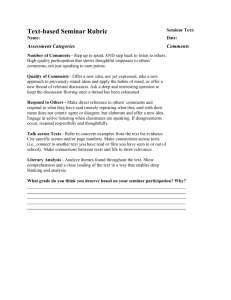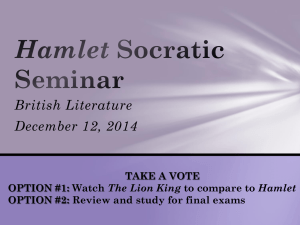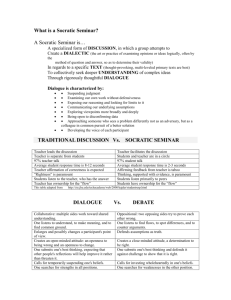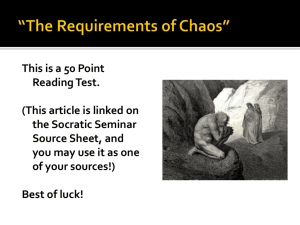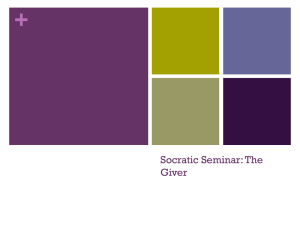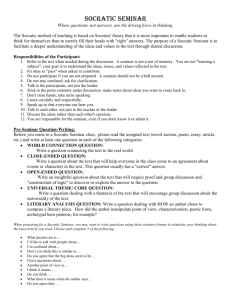File
advertisement
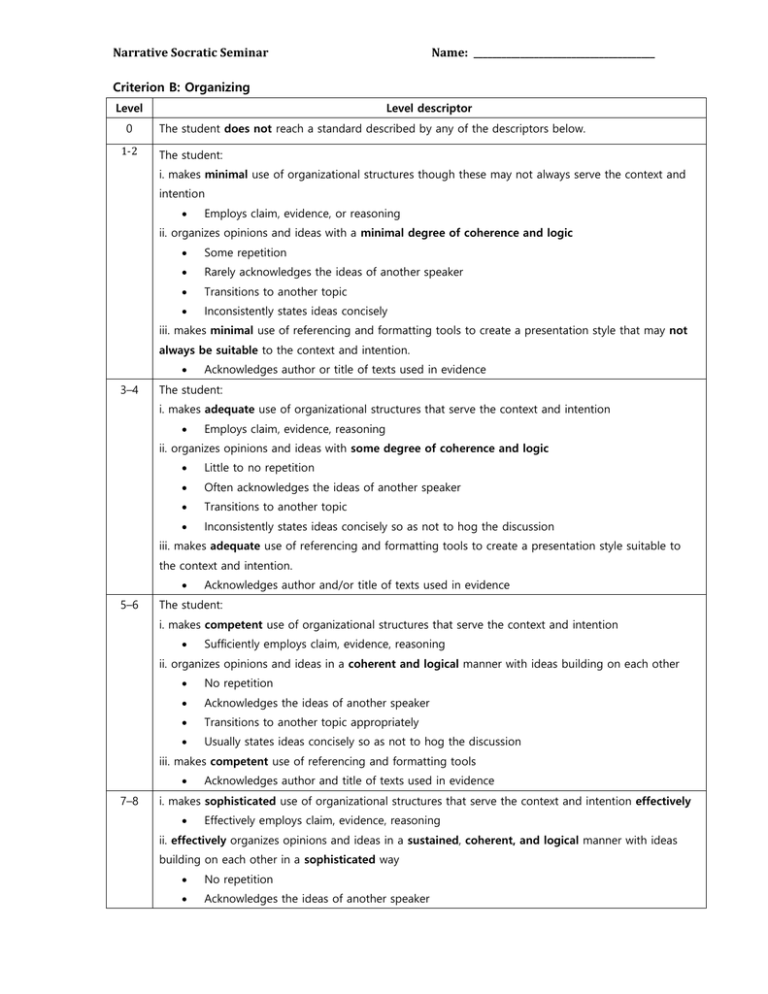
Narrative Socratic Seminar Name: _______________________________________ Criterion B: Organizing Level 0 1-2 Level descriptor The student does not reach a standard described by any of the descriptors below. The student: i. makes minimal use of organizational structures though these may not always serve the context and intention Employs claim, evidence, or reasoning ii. organizes opinions and ideas with a minimal degree of coherence and logic Some repetition Rarely acknowledges the ideas of another speaker Transitions to another topic Inconsistently states ideas concisely iii. makes minimal use of referencing and formatting tools to create a presentation style that may not always be suitable to the context and intention. 3–4 Acknowledges author or title of texts used in evidence The student: i. makes adequate use of organizational structures that serve the context and intention Employs claim, evidence, reasoning ii. organizes opinions and ideas with some degree of coherence and logic Little to no repetition Often acknowledges the ideas of another speaker Transitions to another topic Inconsistently states ideas concisely so as not to hog the discussion iii. makes adequate use of referencing and formatting tools to create a presentation style suitable to the context and intention. 5–6 Acknowledges author and/or title of texts used in evidence The student: i. makes competent use of organizational structures that serve the context and intention Sufficiently employs claim, evidence, reasoning ii. organizes opinions and ideas in a coherent and logical manner with ideas building on each other No repetition Acknowledges the ideas of another speaker Transitions to another topic appropriately Usually states ideas concisely so as not to hog the discussion iii. makes competent use of referencing and formatting tools 7–8 Acknowledges author and title of texts used in evidence i. makes sophisticated use of organizational structures that serve the context and intention effectively Effectively employs claim, evidence, reasoning ii. effectively organizes opinions and ideas in a sustained, coherent, and logical manner with ideas building on each other in a sophisticated way No repetition Acknowledges the ideas of another speaker Narrative Socratic Seminar Name: _______________________________________ Transitions smoothly to another topic appropriately States ideas concisely so as not to hog the discussion iii. makes excellent use of referencing and formatting tools to create an effective presentation style. Clearly acknowledges author and title of texts used in evidence Narrative Socratic Seminar Name: _______________________________________ Guiding Questions for the Narrative Socratic Seminar You will discuss these questions with your classmates in a graded Socratic seminar Instructions Think about the texts we have read in this unit. Use details from them as well as your responses to them (including the experience of writing your own fictional story!) to jot answers to the guiding questions below. Unit Texts (You may not have read all of these, but you certainly read some!) “The Long Road to Forgiveness” by Kim Phuc “Salvation” by Langston Hughes “Shame” by Richard Gregory“Vegetarian Enough” by Annie Choi The House on Mango Street by Sandra Cisneros “Kitty and Mack: A Love Story” by Walter Dean Myers “Curtis” by Paul Fleishman “The Most Dangerous Game” by Richard Connell “The Interlopers” by Saki “Cora Unashamed” by Langston Hughes “The Lesson” by Toni Cade Bambara “Mistletoe” by Jane Bradbury “The Things They Carried” by Tim O’Brien The fictional short story written by YOU! Focus Question 1. How do we tell life stories? Additional Guiding Questions 2. Why do people write stories from life? And why do others read them? What do we have to learn from them? 3. How do people’s experiences shape who they are? How have my experiences shaped who I am? 4. How do authors use writing to deepen their understanding of themselves? How can I use writing to deepen my understanding of myself? 5. Does everyone have a story to tell? 6. How do people engage others in their stories? 7. How do literary elements affect the reader? 8. How do authors depict turning points? 9. What are the consequences—good or bad—of telling one’s story? (for oneself, for readers, for the larger community, etc.) 10. How true are true stories? Does nonfiction mean it’s completely true? 11. How are imaginative stories also true? 12. What literary element is the most effective in portraying a theme? 13. How does recognizing themes help you as a reader? 14. How does the universality of themes reveal the human condition? 15. Which of the narratives caused you to learn something about your own identity or the relationships you have.
